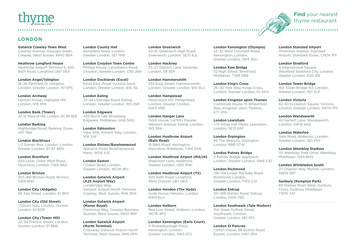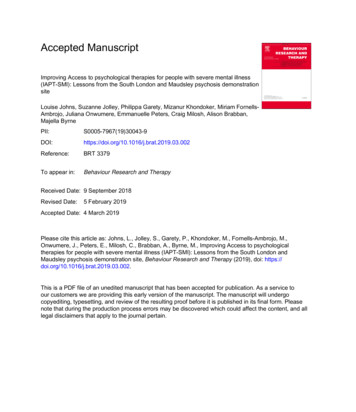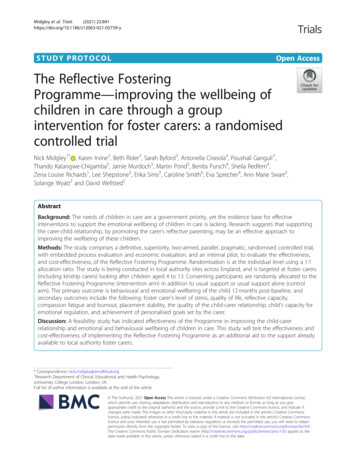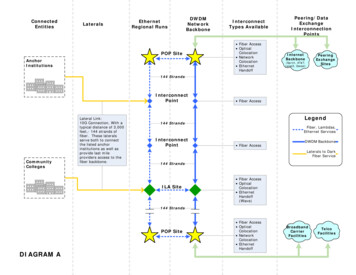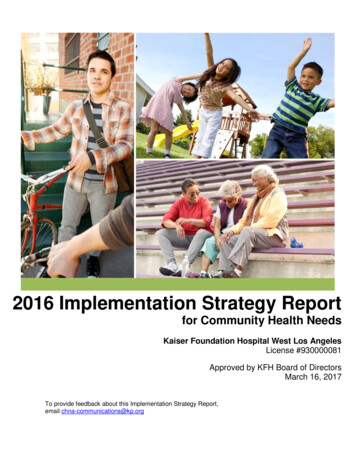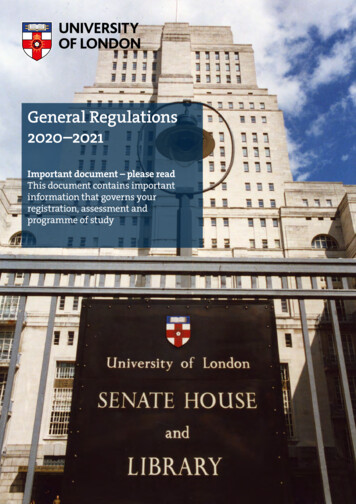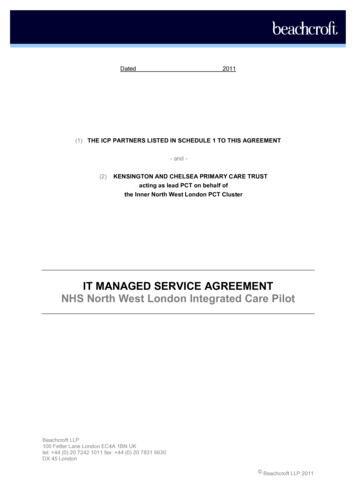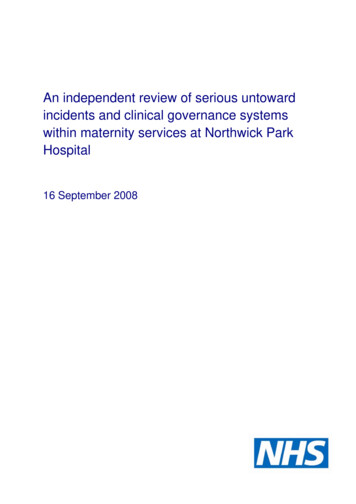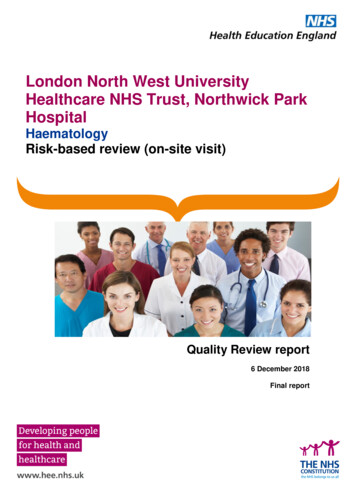
Transcription
London North West UniversityHealthcare NHS Trust, Northwick ParkHospitalHaematologyRisk-based review (on-site visit)Quality Review report6 December 2018Final report
2018-12-06 London North West University Healthcare NHS Trust, Northwick Park Hospital - HaematologyQuality Review detailsBackground to reviewFollowing the previous review of the department in September 2017, HealthEducation England (HEE) recommended that the department be placed underGeneral Medical Council (GMC) enhanced monitoring and this was done. Thecurrent review was planned as a follow-up to assess the training dynamic betweenclinical supervisors, educational supervisors and trainees. In particular, the reviewteam sought reassurance that there was an appropriate balance between trainingneeds and service delivery and that trainees were involved in the ongoing work toimprove the training environment.Training programme / learner Haematologygroup reviewedNumber of learners andThe review team met with six haematology trainees at specialty training levelseducators from each training three to seven (ST3-7). The review team also met with educational and clinicalprogrammesupervisors in the haematology department and Trust representatives including:Review summary andoutcomes Director of Medical Education Medical Education Manager Associate Medical Director for Medical Education and Research &Development Guardian of Safe Working Hours Acting Clinical Director/Divisional Director Educational Lead Director of Strategy and Deputy Chief Executive.The review team identified several areas of good practice, including thecomprehensive teaching programme, investment in recruitment and successfulresolution of some of the historic challenges faced by the department (please seethe Good Practice section at the end of the report.)One Immediate Mandatory Requirement was issued. This related to the lack of arobust process for managing outlier patients and ensuring timely and regularconsultant reviews of these patients (please see Actions section at the end of thereport).The review team also noted the following areas requiring improvement: The junior trainees expressed anxiety about managing outlying patientsand while working out of hours and were reluctant to call their supervisorstoo often during on-call shiftsSpecialty trainees at level three (ST3s) starting in post did not haveappropriate preparation or competency assessment before undertakingon-call shifts and managing haematology outlier patients independentlyTrainees were able to attend clinics at the Ealing and Central Middlesexsites but were rarely able to do so at Northwick Park Hospital2
2018-12-06 London North West University Healthcare NHS Trust, Northwick Park Hospital - Haematology There was significant, ongoing work to improve services and processes inthe department but trainees were not involved and often not aware of this.The review team felt that this was a missed opportunity, particularly as thetrainees were enrolled in the Edward Jenner leadership programmesupported by HEEThe Clinical Lead for haematology had recently left the Trust. Furtherwork was required to recruit to this post and to ensure a sustainableworkforce at all levels was in placeA ’plan B’ was required if the department was unable to recruit toconsultant and senior nurse roles as hoped, in order to develop a robustclinical and training programmeDespite the drive to provide formal teaching sessions, the departmentrequired more robust clinical skills training in the clinical and laboratoryenvironments, for example around bone marrow aspirates and blood filmreporting.Quality Review TeamHEE Review LeadDr Martin YoungExternal ClinicianHead of the LondonSpecialty School ofPathologyDeputyPostgraduate DeanDr Geoff SmithDr Mark EthellConsultant HaematologistThe Royal Marsden HospitalLay MemberDeputy Postgraduate Dean,North West LondonJane GregoryLay RepresentativeHealth Education EnglandGMCRepresentativeSamara MorganHEE RepresentativePrincipal Education QualityAssurance ProgrammeManagerDeputy Head of Quality, PatientSafety & Commissioning TeamHealth Education England,LondonGeneral Medical CouncilHEE RepresentativeLouise BrookerPaul SmollenObserverTolu OniLearning EnvironmentQuality Co-ordinatorLearning Environment QualityCo-ordinatorQuality, Patient Safety &Commissioning TeamQuality, Patient Safety &Commissioning TeamHealth Education England,LondonHealth Education England,LondonEducational overview and progress since last visit – summary of Trust presentationThe review team asked about the Trust’s response to the General Medical Council National Training Survey(GMC NTS) 2018 results. The Director of Medical Education (DME) advised that there was disappointment atthe results due to the work which had been done to improve the atmosphere in the department andcommunication within the team. Following the previous review in 2017, the consultants had undergone a twoday mediation process and the department ran training sessions on stress management and communicationskills. The DME indicated that trainees were now well-supported by the consultants and none of the currenttrainees had reported witnessing or experiencing bullying and undermining.3
2018-12-06 London North West University Healthcare NHS Trust, Northwick Park Hospital - HaematologyThere had been changes to the management of the department and an external service review led by the Chairof the British Society of Haematologists. The external review found that service demands had grown but that theTrust investment in the department had not kept pace with them. This had led to increased workloads andmeant that at any given time there were between 10 and 25 haematology patients admitted to outlier wards asthe haematology ward had just 14 beds. The department Clinical Lead had recently left the Trust leaving thispost vacant. The review team was informed that, following the external review, the department had become partof the Integrated Clinical Services division and the Trust had allocated funding to increase the capacity of thedepartment. Work was in progress to build a new 20-bedded haematology ward which was co-located with theday care unit, increasing the overall bed base by six. This was due to open in January 2019.There were 8.5 whole time equivalent (WTE) substantive consultants in the department, six locum consultantsand the day care unit was largely staffed by two locally-employed doctors (LEDs). The Acting Divisional Director(ADD) advised that the department had budget for 16 WTE consultants and the Trust aimed to increaseconsultant staffing to this level by mid-2020. The DME reported that none of the locum consultants wereeducational supervisors (ESs) but that some had worked with the Trust for over a year and had recently startedES training. The ADD reported that a business case for a consultant pharmacist had been submitted. The Trusthad created a new haematology general manager post and successfully recruited to this role. Managementresponsibility for the day unit nursing team had been reallocated to the Trust’s lead oncology nurse. It washoped that this change in management would enable the day unit and chemotherapy nurses to work moreclosely together and make these nursing roles more interesting and attractive to candidates during recruitment.The postgraduate medical education (PGME) team had met with the trainees after the GMC NTS results werereleased to discuss the issues raised in more detail. Workload was a key concern, particularly in the day careunit and the laboratory. In day care this was linked to a lack of nursing management and inefficient processes.The review team heard that new standard operating procedures were being written, that the department wasworking to recruit a nursing lead for day care and that LEDs rather than trainees were allocated to day care mostdays, so trainees spent minimal time in the unit. In the laboratory a clinical audit was in progress to assess howmany films were inappropriately referred for medical review rather than being reviewed by a biomedical scientist(BMS). The Trust was considering appointing senior BMSs to oversee the triage process in order to addressthis.The DME reported that the department had regular local faculty group (LFG) meetings where trainees could givefeedback and that trainees reported meeting with their educational supervisors regularly and completingworkplace-based assessments as needed. The trainees had informed the DME that local teaching wasimproving and that the GMC NTS red outlier result for regional teaching was due to session cancellations whichwere outside of the Trust’s control. When asked about the red outlier results in the GMC NTS for clinicalgovernance and supervision, the trainees had been unable to identify the reasons for these. The departmenthad set up boxes for trainees to submit written feedback confidentially if they did not wish to raise concerns atmeetings or with their supervisors.The Education Lead (EL) described the new teaching programme which had been implemented following theexternal review. There were one-hour teaching sessions held at the start of trainee day shifts from Tuesday toFriday each week. The sessions covered a range of topics and included subjects such as cardiology, fertility andradiology as well as haematology. The EL reported that there were good levels of attendance at these sessions.The Guardian of Safe Working Hours (GoSWH) stated that trainees were taught and encouraged to submitexception reports. In the previous quarter the GoSWH had received four exception reports from haematologytrainees, two of which were for working additional hours and two for missed educational opportunities. TheGoSWH advised that trainees were known to under-report, particularly at higher training grades.4
2018-12-06 London North West University Healthcare NHS Trust, Northwick Park Hospital - HaematologyFindings1. Learning environment and cultureHEE Quality Standards1.1 The culture is caring, compassionate and provides safe and effective care for patients, service users,carers and citizens and provides a supportive learning environment for learners and educators.1.2 The learning environment and organisational culture value and support education and training sothat learners are able to demonstrate what is expected in order to achieve the learning outcomesrequired by their curriculum or required professional standards.1.3 The learning environment provides opportunity to develop innovative practice, engage in researchactivity and promotes skills and behaviours that support such engagement.1.4 The learning environment delivers care that is clinically or therapeutically effective, safe andresponsive, and provides a positive experience for patients and service users.1.5 The learning environment provides suitable facilities and infrastructure, including access to qualityassured library and knowledge services.1.6 The learning environment and culture reflect the ethos of patient empowerment, promoting wellbeingand independence, prevention and support for people to manage their own health.RefFindingsH1.1Patient safetyActionrequired?RequirementReferenceNumberThe trainees expressed concerns about the safety of haematology inpatients admittedto outlier wards. The review team heard that patients presenting out-of-hours could beadmitted to an outlier ward by the medical on-call team and might be referred to thehaematology team on admission, at handover the next morning or following themedical ward round. There was some anxiety that the referral system was inconsistentand created potential for patients to be ‘lost’ to the haematology team. The traineesadvised that sometimes outlier patients were seen by medical consultants on post-takeward rounds, but this was not always done and the frequency of in-personhaematology rounds varied depending on the consultant on duty. The review teamwas informed that most patients were seen by a consultant at least twice per week,with trainee-led rounds and consultant reviews of patient notes each day. When askedwhether they would be happy for friends and family to be treated in the unit, thetrainees advised that this would depend on which consultant was on the rota andwhether the patient would be admitted to the haematology ward or to an outlier ward.The supervisors advised that if there were concerns about a patient on an outlier ward,the team could arrange to transfer the patient onto the haematology ward and transferout a more stable patient. The Educational Lead (EL) noted that at local faculty group(LFG) meetings the main issue raised about outliers was the time taken to movearound the hospital to see these patients. It was reported that the Trust was working toimprove admission processes so that, as far as possible, each specialty haddesignated outlier wards rather than patients being admitted to the first available bed.It was hoped that this would reduce the time required for outlier ward rounds andstandardise referral processes. When the new haematology ward was operational, thedepartment was to have six additional inpatient beds, reducing the number of outliers.The trainees advised that specialty trainees at level three (ST3s) were included in thehaematology on-call rota from early in their rotations and were responsible for5Yes, pleasesee H1.1a
2018-12-06 London North West University Healthcare NHS Trust, Northwick Park Hospital - Haematologyproviding expert advice to clinicians in other specialties. The trainees felt apprehensiveabout having this level of responsibility so early in their rotations and, although theywere able to contact the on-call consultant, were reluctant to call and ask questions toofrequently. The senior trainees reported that they felt responsible for helping andoverseeing the ST3s, who were often more comfortable seeking advice from seniortrainees than consultants. The review team was informed that there was norequirement for trainees to complete certain assessments or demonstrate a level ofskill or knowledge prior to going on-call.H1.2Yes, pleasesee H1.1bRotasThe trainees advised that their day shifts lasted from 08:30 to 18:00 and that they wereusually able to leave on time when working in the laboratory, in the red cell team or onthe inpatient ward. Trainees reported that they sometimes worked late when coveringthe outlier patients due to the time taken to walk around the hospital site. This couldalso depend on whether the consultant led the round and what time the consultantstarted the round. All trainees had been encouraged to submit exception reports whenappropriate and had been taught how to report during the Trust induction.The trainees described the unit as busy and felt that staff workloads were high.Despite this, the trainees reported that they had good support from consultants andfrom each other. The review team was advised that it was important to have a mix ofjunior and senior trainees on the rota due to the complexity and volume of work andthat junior trainees were paired with a senior trainee in the laboratory wheneverpossible. The supervisors noted that a consultant was assigned to cover the laboratoryevery day to review more complex films or bone marrows and to supervise trainees.Historically there had been issues with trainees being unaware of supervisionarrangements in the laboratory, so the consultant rota was now displayed on the wall tomake this clear. The trainees thought that new ST3s should be assigned to wardduties when they started work in the department as there was more consultant supportavailable there. The review team heard that two physician associates had beenrecruited and were due to start in early 2019. It was hoped that this would alleviatejunior trainee workloads on the ward, particularly relating to administrative tasks.The trainees reported that there were daily consultant rounds, including at weekends.Trainees carried out daily rounds of outlier patients. The rota was arranged by an ST7trainee who informed the review team that outlier duties and work at the Ealing andCentral Middlesex sites were organised into three or four week blocks to providecontinuity for the trainees and the patients. The supervisors advised that there hadbeen no gaps in the junior doctor rota in the past six months. When the new cohort ofST3s had started their rotations in August, the supervisors reported that thedepartment had brought in a locum junior doctor to assist with workloads during thetransition period.H1.3Work undertaken should provide learning opportunities, feedback onperformance, and appropriate breadth of clinical experienceThe trainees reported that they were able to gain clinic experience when working atEaling Hospital and Central Middlesex Hospital but that they rarely attended clinics atNorthwick Park Hospital, where they spent the majority of their time. It was noted thatclinics were not included in the rota at the Northwick Park site which meant thattrainees could only attend them if workload on the wards or in the laboratory allowed.The supervisors were aware that trainees attended clinics infrequently and advised thatclinic time had been included in the rota for previous trainee cohorts.6Yes, pleasesee H1.3
2018-12-06 London North West University Healthcare NHS Trust, Northwick Park Hospital - Haematology2. Educational governance and leadershipHEE Quality Standards2.1 The educational governance arrangements continuously improve the quality and outcomes ofeducation and training by measuring performance against the standards, demonstrating accountability,and responding when standards are not being met.2.2 The educational, clinical and corporate governance arrangements are integrated, allowingorganisations to address concerns about patient and service user safety, standards of care, and thestandard of education and training.2.3 The educational governance arrangements ensure that education and training is fair and is based onprinciples of equality and diversity.2.4 The educational leadership ensures that the learning environment supports the development of aworkforce that is flexible and adaptable and is receptive to research and innovation.2.5 The educational governance processes embrace a multi-professional approach, supported throughappropriate multi-professional educational leadership.H2.1Impact of service design on learnersThere was a discussion of the improvement work underway in the department. Thetrainees were aware of some of the ongoing projects but explained that they were oftentold about these projects informally by consultants or other colleagues rather thanbeing involved in the quality improvement process or formally told about the servicedevelopment programme. The trainees were enrolled in the Edward Jenner supportedleadership programme and the review lead suggested that there were opportunities toapply the learning from this programme to projects within the department. The traineesagreed that there were plenty of potential quality improvement projects such as the dayunit staffing restructure, a review of processes and workloads in the laboratory andreview of the elective admission processes. The supervisors advised that the Trustplanned to start holding regular meetings with colleagues at the Royal MarsdenHospital to discuss integrated reporting and that trainees would be involved in thesemeetings.The trainees had met with the Director of Medical Education (DME) and the ActingDivisional Director (ADD) and given feedback about their experience in the department.One area the trainees highlighted was the workload in the laboratory, particularly thehigh numbers of bone marrows and blood films referred to trainees by the laboratory.The review team heard that many of these tests did not need medical review and couldhave been undertaken by a senior biomedical scientist (BMS). The trainees wereaware that the department was considering employing a senior BMS to address thisissue. The supervisors informed the review team that the consultants were working totrain the BMSs around referrals and that there were annual audits of blood filmreferrals to monitor numbers. The review team heard that there was an average of 300blood films processed each day, 10% of which were referred for medical review. Thesupervisors reported that there was a standard operating procedure in place forreferrals but that it had proven difficult to implement this in practice and establish clearremits for BMSs and junior doctors. The laboratory was run by a private company, TheDoctors Laboratory (TDL), who employed the BMSs. The supervisors felt that this hadcaused some of the issues around clarity of roles, as BMSs were not able to access fullNHS patient records or determine which consultant was responsible for each patient.The department was considering possible solutions for this. There were regularmeetings between the Trust and TDL and the supervisors had found that TDL wasreceptive to feedback and willing to increase the number of BMSs.7Yes, pleasesee H2.1a
2018-12-06 London North West University Healthcare NHS Trust, Northwick Park Hospital - HaematologyThe trainees advised that they had also fed back to the DME about the challenges inthe day care unit, including the administrative burden of requesting investigations onpaper forms and obstruction from some of the nursing staff when trainees referredpatients to the unit. The review team heard that some nurses would refuse referralsand advise trainees to refer patients to the emergency department even if the day unitwas not full. The EL reported that the department had allocated locally employeddoctors (LEDs) to cover the day care unit after trainees had raised concerns. TheLEDs worked in the unit four days per week, reducing the amount of time that traineeswere required to spend there.The bone marrow specialist nurse had recently left the Trust so the trainees on thelaboratory rota had been assigned responsibility for taking bone marrow biopsies. TheST6 and ST7 trainees were able to cope with this workload and were more confident inchallenging referrals which they felt were inappropriate or not justified. The ST3trainees reported that it was more difficult for them to manage this additional workload.The review team was informed that the department planned to recruit furthersubstantive consultants, physician associates and specialist nurses. The review leadpointed out that several London Trusts were competing to recruit staff, particularlyconsultants and specialist nurses. The DME reported that the Trust was consideringother strategies, such as employing clinical fellows to act as resident medical officers inthe private wards and altering clinic arrangements to reduce workloads.H2.2H2.1bSystems and processes to identify, support and manage learners when there areconcernsThe supervisors reported that the department had had trainees requiring additionalsupport (TRAS) in recent years. The EL advised that the supervisors andPostgraduate Medical Education (PGME) team worked in conjunction with the specialtyschool and training programme director to provide trainees with the necessary support.The review team heard that these trainees had successfully met the curricularrequirements and progressed in their training.3. Supporting and empowering learnersHEE Quality Standards3.1 Learners receive educational and pastoral support to be able to demonstrate what is expected intheir curriculum or professional standards and to achieve the learning outcomes required.3.2 Learners are encouraged to be practitioners who are collaborative in their approach and who willwork in partnership with patients and service users in order to deliver effective patient and service usercentred care.H3.1Behaviour that undermines professional confidence, performance or self-esteemThe trainees were aware of the historic issues around difficult working relationshipsbetween some consultants in the department and the impact this had on previouscohorts of trainees. The trainees advised that this knowledge had made themapprehensive prior to starting their rotations at the Trust, but that the atmosphere andculture of the department was much improved. None of the trainees reportedexperiences of bullying or undermining. In particular, the post-weekend handovermeeting on Monday morning had been a source of anxiety but trainees now found thismeeting productive and felt that consultants were supportive of their clinical decisions.8
2018-12-06 London North West University Healthcare NHS Trust, Northwick Park Hospital - HaematologyH3.2Access to study leaveThe supervisors informed the review team that trainees were encouraged to attendtraining and present at conferences and that the majority of study leave requests weregranted. The EL noted that the trainees coordinated their study leave requests toensure sufficient rota coverage which was helpful to the PGME team.4. Supporting and empowering educatorsHEE Quality Standards4.1 Appropriately qualified educators are recruited, developed and appraised to reflect their education,training and scholarship responsibilities.4.2 Educators receive the support, resources and time to meet their education, training and researchresponsibilities.H4.1Sufficient time in educators’ job plans to meet educational responsibilitiesThe educational supervisors advised that there was time allocated in their job plans forsupervision activities. This included supervision of clinical fellows as well as trainees.Some consultants did not have written job plans at the time of the review as theprocess of writing and updating job plans was ongoing, but these consultants had beenassured that 0.25PA (programmed activities) would be allocated for each junior doctorthey supervised.5. Developing and implementing curricula and assessmentsHEE Quality Standards5.1 Curricula assessments and programmes are developed and implemented so that learners areenabled to achieve the learning outcomes required for course completion.5.2 Curricula assessments and programmes are implemented so that all learners are enabled todemonstrate what is expected to meet the learning outcomes required by their curriculum or requiredprofessional standards.5.3 Curricula, assessments and programme content are responsive to changes in treatments,technologies and care delivery models and are reflective of strategic transformation plans across healthand care systems.5.4 Providers proactively engage with patients, service users, carers, citizens and learners to shapecurricula, assessments and course content to support an ethos of patient partnership within the learningenvironment.H5.1Training posts to deliver the curriculum and assessment requirements set out inthe approved curriculumThe trainees were aware of the drive within the department to increase the amount offormal teaching sessions and to ensure that trainees working at the NPH site werereleased to attend teaching. The sessions were run from 08:30 to 09:30 four dayseach week. The supervisors advised that they aimed to make the sessions interactiveby including scenarios and case discussions, as well as holding revision sessions priorto examination dates.The review lead asked about clinical skills teaching and how this was delivered. Thesupervisors reported that the clinical nurse specialist (CNS) who had done most of thebone marrow biopsy work and teaching had left and that one of the doctors working inthe day unit had taken over this work. The supervisors reported that junior trainees9
2018-12-06 London North West University Healthcare NHS Trust, Northwick Park Hospital - Haematologywere taught to perform bone marrow biopsies and intrathecal chemotherapyadministration during their departmental induction and by consultants and seniortrainees in the clinical areas. The supervisors advised that senior trainees needed tolearn teaching skills in preparation for future consultant roles. The trainees informedthe review team that some consultants were invested in teaching in practice but thatothers separated formal teaching from service provision. The trainees felt that therewere missed opportunities for practical teaching in the clinical and laboratoryenvironments, for example around bone marrow aspirates and blood film reporting.Yes, pleasesee H5.1The review team heard that in the two years prior to the review all trainees who hadattempted the Member of the Royal College of Pathologists examinations had passed.6. Developing a sustainable workforceHEE Quality Standards6.1 Recruitment processes to healthcare programmes fully comply with national regulatory and HEEstandards.6.2 Learner retention rates are monitored, reasons for withdrawal by learners are well understood andactions are taken to mitigate attrition of future learners.6.3 Progression of learners is measured from commencement to completion for all healthcare learningprogrammes.6.4 First destination employment is recorded and retention within first year of employment monitored,including the recording of reasons for leaving during the first year of employment.6.5 Transition from a healthcare education programme to employment is underpinned by a clear processof support developed and delivered in partnership with the learner.H6.1Learner retentionWhen asked whether they would consider applying for consultant roles in thedepartment in future, the trainees were divided. Some felt that there was potential inthe department for further positive change and that this would encourage them toremain there as consultants.Good Practice and RequirementsGood PracticeThe review team heard that the Trust took concerns about workload in the department seriously. There wasrecruitment underway for physician associates, senior nurses and consultants, with some new staff due to start inJanuary 2019.The trainees all agreed that the historic issues around bullying, undermining and difficult working relationshipsbetween consultants in
2018-12-06 London North West University Healthcare NHS Trust, Northwick Park Hospital - Haematology 2 . responsibility for the day unit nursing team had been reallocated to the Trust's lead oncology nurse. It was . the team could arrange to transfer the patient onto the haematology ward and transfer out a more stable patient. The .
